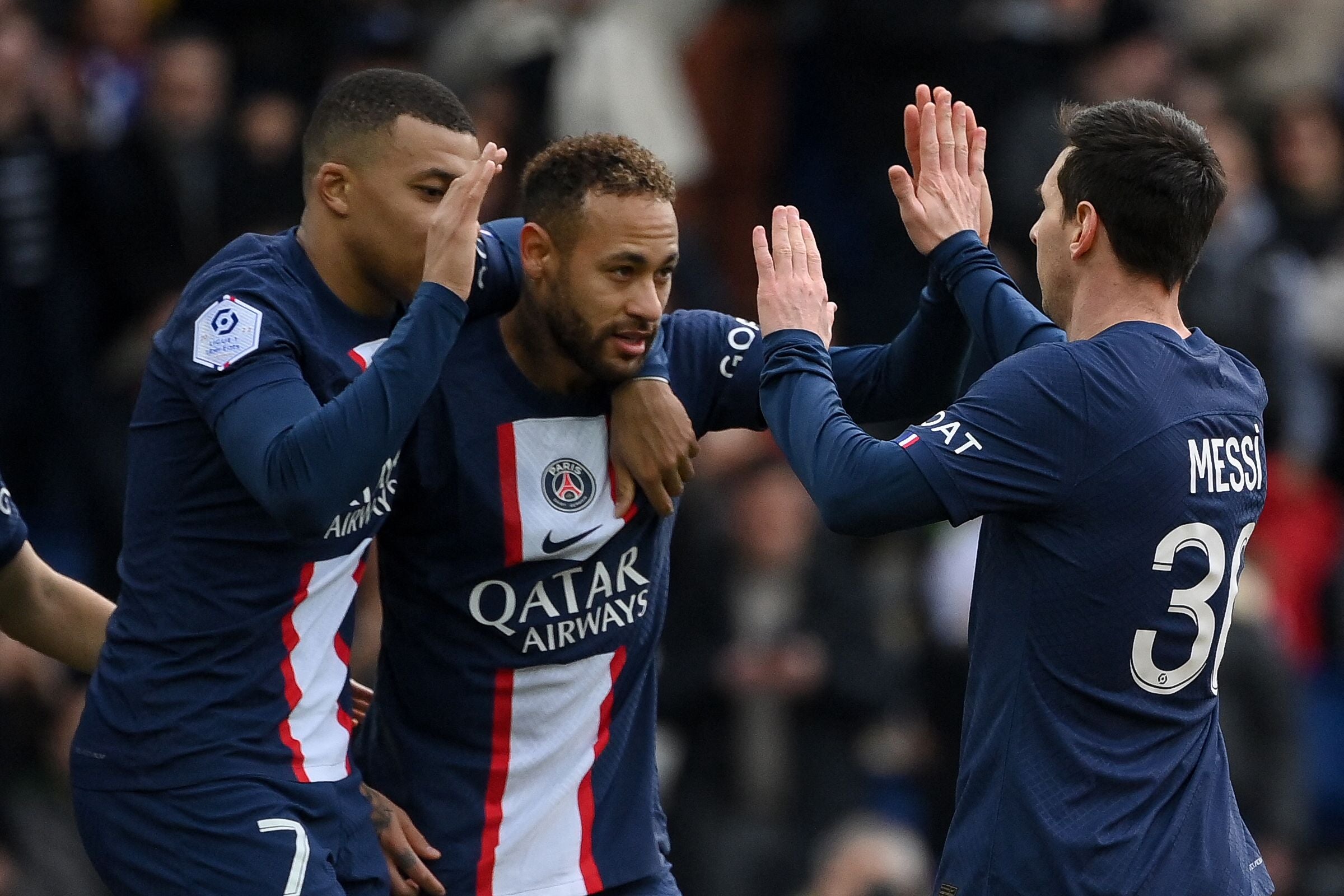
A beleaguered club may require a new name as well as a new forward line. “This is not Kylian Saint-Germain,” wrote Kylian Mbappe a couple of months ago, complaining with unnecessary publicity about his image being used to sell season tickets. Which, whether this season or next, probably won’t include the chance to watch him. Perhaps the 11-time champions of France will have to be rebranded Paris Saint-Germain.
Certainly they require a new identity, a new ethos and a less glamorous attack. The Parisian Galacticos are being broken up: Lionel Messi is off to Miami, Mbappe, whether this summer or next, could be bound for Real Madrid, Neymar might follow the money to Saudi Arabia, though it seems PSG will be happy to offload him to anyone, anywhere.
If Paris Saint-Germain assembled the most star-studded front three in footballing history, all it ultimately brought them was mockery and misery. Between them, they scored five of the six goals in the World Cup final (the other came from the former PSG player Angel Di Maria), winning both the Golden Boot and the Golden Ball. But their club have lost four of their last six home games. Messi was booed by their supporters. No one was seduced by the supposed glitziness of it anymore: not the players, and not the fans either. Lens felt Ligue Un’s real success story, its champions the real failures.
Meanwhile, a comparable club achieved what PSG hoped to. Manchester City have also had an injection of investment and ambition from a small, oil-rich Gulf state. They won the Champions League, months after PSG exited in the last 16. There was a point where it appeared a genuine shock when Paris Saint-Germain beat an early retreat: not now, and Bayern Munich’s achievement in beating them counted for so little that Julian Nagelsmann was soon sacked (that he was replaced by Thomas Tuchel highlighted the German’s feat in taking PSG to the 2020 final and how others recognise it).
If Messi leaves Paris without playing in a Champions League quarter-final, City provided the example that money alone did not turn them into a team or forge a compelling gameplan. There was a lesson, too, in that City’s 2021 semi-final victory over PSG was inspired by Riyad Mahrez, a boy from the banlieues of Paris, just as Bayern’s 2020 final winner came from another, Kingsley Coman: despite being in the city that represents arguably the greatest talent factory in world football now, a club with a fixation with the famous have contrived to miss out on most of them and Mbappe was the only Frenchman to start more than 12 league games last season.
They have had a soulless vanity project where there was the opportunity for something more organic, more endearing, more inspiring. Their tactics have been warped by having three forwards with a marked aversion to work off the ball, let alone anything as coordinated as pressing. They have attempted to compensate at times by stocking the midfield with workhorses, with players such as Ander Herrera and Idrissa Gueye, as though confining creativity to the attack.
Theirs have seemed tactics from another era: the footballing servants charged with winning the ball back and giving it to their masters. Managers with collectivist principles, whether Unai Emery, Tuchel or Mauricio Pochettino have come and gone, with Christophe Galtier presumably next to follow them to the exit, the German coming closest to truly succeeding, but none able to fully flourish amid the cult of the big names. Meanwhile, PSG are the star vehicle that became involved in car crashes in the last 16 of the Champions League.

And PSG have felt trapped in a pattern of quick fixes. They have looked to import winners but now have Champions League and World Cup winners scattered out on loan: Keylor Navas at Nottingham Forest, Gini Wijnaldum at Roma, Leandro Paredes at Juventus, Julian Draxler at Benfica.
Meanwhile, Mbappe has at least been consistently outstanding in Ligue Un. Messi’s first season was underwhelming. Neymar’s injuries means he only tends to play about half of every season, making his €222 million transfer fee still more ludicrous. Meanwhile, some of PSG’s real success stories were perhaps their predecessors: Zlatan Ibrahimovic and Edinson Cavani stacked up the goals before the club descended into parody. Some of the triumphs have been the world-class players who were not superstars: Thiago Silva, Marquinhos, Marco Verratti, each happy to stay for years, all men who could have been cornerstones of a more coherent side.
Maybe the inherent weakness of the French league has counted against PSG, leaving them ill-prepared for Champions League knockout ties. But Benfica have played in two quarter-finals since France staged one: teamwork can still compensate.
So the exodus of the Galacticos ought to provide a chance to restore some principles. In one respect, PSG will clearly be far weaker when stripped of Messi, Neymar and, in particular, Mbappe. In another, they have to become stronger: more unified, more industrious, harder to beat, capable of going further in Europe.







